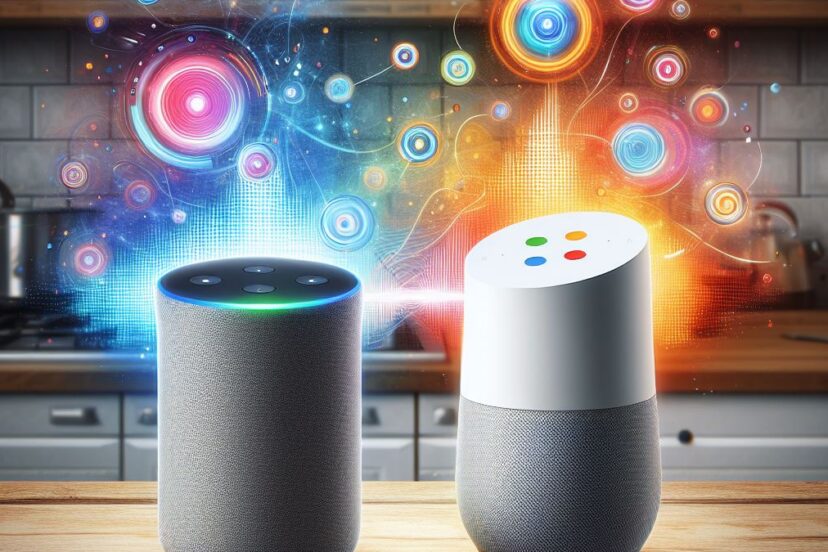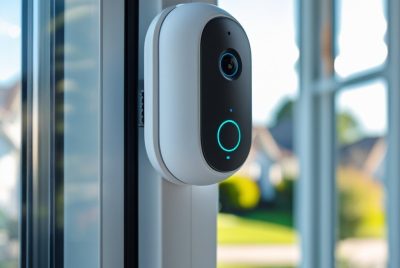Alexa vs Google Home: Unveiling the Best Smart Assistant
*We may earn a commission for purchases made using our links. Please see our disclosure to learn more.
Alexa vs Google Home: Unveiling the Best Smart Assistant
The Ultimate Showdown Alexa vs Google Home? In the realm of smart home technology, smart speakers have become central to modern living, often acting as the hubs of connected home ecosystems. Two industry leaders, Amazon’s Alexa and Google Home, offer a range of capabilities that can make the decision of choosing between them challenging. My comparison of these voice assistants focuses on their functionality, compatibility with other smart devices, and the unique features they bring to the table.

As I examine Alexa and Google Home, I consider not only my personal experience but also the critical insights from users and experts alike. Alexa, known for its widespread integration with various smart home devices and companionship with Amazon services, provides convenience and utility for users invested in Amazon’s ecosystem. On the other hand, Google Home stands out for its search engine prowess and seamless synchronization with the Google suite and Android devices, offering a robust voice-activated experience.
Diving into the specifics, voice assistant responsiveness, user interface, and the ability to manage day-to-day tasks are factors I take into account. Both platforms support a variety of smart home features, yet they each have their own strengths and advantages. My analysis aims to present a balanced view, helping users to decide which smart speaker might best fit their lifestyle and home automation needs.
Understanding Smart Speakers

In this section, I explore the smart speaker universe, focusing on defining these devices, introducing the key market leaders—Amazon and Google—and sketching a brief industry overview.
Defining Smart Speakers
Smart speakers are AI-powered devices designed to interact with users using voice commands. They play music, control smart home gadgets, provide information, and more, by connecting to various internet services.
Key Players: Amazon and Google
- Amazon Echo: A range of speakers powered by Amazon’s Alexa, capable of voice interaction, music playback, making to-do lists, setting alarms, and providing weather, traffic, and other real-time information.
- Google Nest: Formerly known as Google Home, this line of smart speakers offers similar functionalities through Google Assistant, Google’s AI.
Both ecosystems allow for a variety of commands and are compatible with numerous third-party smart home devices, demonstrating the diverse capabilities of modern smart home technology.
Industry Overview
The smart speaker industry has seen significant growth with these devices becoming central to many users’ home ecosystems. Amazon’s Echo and Google Nest, both support a broad range of smart devices and have expanded their abilities beyond simple voice commands to become integral parts of smart home automation and personal assistance.
Design and Hardware Comparison

When considering the Amazon Echo and Google Home smart speakers, I focus on their design, audio capabilities, and the range of models they offer.
Physical Build and Aesthetics
The Amazon Echo range typically showcases a cylinder-like shape with fabric covers that can blend into home decor with ease. Some models, like the Echo Dot, are more compact and puck-shaped. The Echo Show variants add a screen into the mix, turning the device into a smart display that’s useful for video calls and streaming. On the other hand, Google Home devices favor a minimalist and sleek design. For example, the Google Nest Mini adopts a simple, round look with fabric texture, and the Google Home Max opts for a rectangular form factor that’s both modern and subtle.
Speaker and Audio Quality
In terms of audio performance, the Echo Studio stands out within Amazon’s lineup for its emphasis on high-fidelity sound with features like Dolby Atmos and 3D audio. The Echo Show 5 and Echo Show 8 also integrate speakers that complement their visual capabilities. Google’s counter, the Nest Audio, is engineered for music lovers boasting impressive sound quality and clear vocals. The Google Home Max is especially renowned for its deep bass and room-filling sound.
Device Variants and Models
Amazon’s Echo family is extensive, with models like the Echo Dot for basic functionality, Echo Show 5 and Echo Show 8 for mid-range smart displays, and the Echo Studio for premium sound experiences. Google offers a varied lineup as well, including the Google Nest Mini as its entry-level option, Nest Audio for a more robust audio experience, and the Google Home Max as the most powerful speaker in terms of hardware and audio performance.
Voice Assistants and Capabilities

In comparing Amazon Alexa and Google Assistant, I’ll focus on how they process voice commands, their respective skills and actions, and how they integrate with smart home devices.
Voice Command Processing
Amazon Alexa and Google Assistant exhibit prowess in understanding and processing natural language. Both are engineered to recognize a vast array of vocal inputs. The Amazon Echo Dot and Google Nest Mini have been designed to accurately capture voice commands even in noisy environments. Notably, Google Assistant often leverages Google’s search database to understand context, which can lead to more nuanced responses. Alexa, on the other hand, has been tuned to execute a variety of tasks and can even differentiate between different user’s voices using its Voice Profiles feature.
Skills and Actions
When it comes to expandable capabilities, Alexa uses “Skills” while Google Assistant employs “Actions”. Both function as extensions of the virtual assistant’s base capabilities. Here’s a brief comparison:
- Alexa Skills: Over 100,000 available, ranging from trivial games to crucial productivity tools.
- Google Actions: Emphasizes integration with Google’s services and apps, potentially offering a more seamless experience for users who are heavily invested in the Google ecosystem.
I find that both platforms encourage third-party developers to create new functionalities, continuously expanding the repertoire of what these smart assistants can do.
Smart Home Integration Alexa vs Google Home
Smart home integration is a cornerstone of both Amazon Alexa and Google Assistant‘s functionalities. They connect with a myriad of devices, including smart lights like Philips Hue, smart locks, thermostats, and more for comprehensive smart home control. Below is a comparative overview:
| Features | Amazon Alexa | Google Assistant |
|---|---|---|
| Device Compatibility | High, including Amazon-produced and third-party devices. | Also extensive, with seamless pairing on Google ecosystem. |
| Setup Process | Simplified via the Alexa app and supported by routines. | Streamlined, particularly on devices with built-in Assistant. |
| Voice Control | Direct voice commands to control smart devices. | Possesses similar voice command functionality. |
| Routines | Customizable actions that can be triggered by a single command or scheduled. | Automations that integrate various devices and services. |
Essentially, both assistants excel in allowing users to orchestrate smart home devices effortlessly, with Alexa slightly leading in sheer volume of compatibilities, while Google Assistant is known for its integration with Google-based smart home products.
Alexa vs Google Home: Connectivity and Compatibility

In the developing realm of smart home ecosystems, I find that the connectivity and compatibility of a device are integral to its functionality and user experience.
Alexa vs Google Home: App and Device Ecosystem
Google Home and Amazon Alexa platforms both offer robust app ecosystems accessible through compatible phones or tablets. Google Home leverages the Google Home app, which connects seamlessly with other Google services and devices, including Chromecast for media streaming. Alexa devices are managed through the Amazon Alexa app, providing comprehensive control and a rich connection with the Amazon ecosystem, especially for online shopping needs.
- Google Home App: Available on Android/iOS, integrates with Google services and Chromecast.
- Amazon Alexa App: Available on Android/iOS, connects with Amazon services.
Third-Party Integration
Alexa excels with its vast array of third-party integrations known as Skills, which users can enable for an expanded range of capabilities. Google Home, although less reliant on separate apps for third-party services, supports a wide range of devices and services, including those from Samsung SmartThings and IFTTT (If This Then That), promoting a rich home automation experience.
- Alexa: Extensive library of third-party Skills.
- Google Home: Not as Skill-dependent; native support for Samsung SmartThings and IFTTT.
Support for Standards and Protocols in Alexa vs Google Home
Both platforms are increasingly embracing Matter, the new industry-unifying standard that promises interoperability among smart home products, streamlining the connectivity between devices. My understanding is that both are also compatible with various Bluetooth devices, which allows for straightforward pairing with a plethora of smart home gadgets. The inclination towards open standards exhibits their commitment to a user-friendly smart home environment.
- Matter: Both platforms are moving towards supporting this protocol.
- Bluetooth: Supported by both Alexa and Google Home devices for easy device pairing.
Privacy, Security, and Cost Considerations
Comparing Alexa and Google Home, I’ll focus on user data handling, smart device security, and value for price.
Data Protection and User Privacy
Google Home and Amazon’s Alexa come equipped with security features to protect user data. Google Home devices, such as the Google Nest Hub Max, emphasize the use of encryption and regular security updates. Amazon’s Echo devices, compatible with Ring and Blink cameras, also use encryption and allow users to review and delete voice recordings. For video devices like Nest Hub Max, Ring, and Blink Video Doorbell, I find that thorough privacy settings are critical, as these devices can record visual and audio data.
- Cameras and Video Doorbells: Users can generally set these devices to send alerts when unexpected activity is detected.
- Plugs and Thermostats: Typically, these do not record personal data, but it’s important that they operate on a secure network to prevent unauthorized access.
Price Point and Value for Money
The cost of Google Home and Amazon Alexa devices varies based on functionality and compatibility. Entry-level smart speakers may start at a relatively low price, which allows users to test the waters before committing to more advanced features. For users on a budget, smart plugs and basic thermostats offer an affordable way to gain smart home functionality.
- Smart Speakers: Prices range from below $50 to about $200 for more advanced devices with screens.
- Smart Home Devices: Smart plugs and thermostats cost between $25 to $250, depending on features.
Considering both ecosystems, I find that Amazon Alexa tends to associate with a broader range of third-party devices, potentially making it a more cost-effective solution for users invested in creating a smart home. However, Google Home often includes Google services natively, which might offer better integration for users already using Google’s ecosystem.
Frequently Asked Questions
1. What are the distinctive features of Alexa and Google Home?
Alexa, the smart assistant by Amazon, excels at smart home device integration and has a vast third-party skill ecosystem. Google Home, powered by Google Assistant, is known for its superior natural language processing and deep integration with Google services.
2. Which smart assistant offers better sound quality, Alexa or Google Home?
Sound quality can vary within the product ranges of both Alexa and Google Home devices. Generally, premium models such as the Amazon Echo Studio and Google Home Max aim to provide higher-quality sound that appeals to music enthusiasts.
3. How do the costs of Alexa and Google Home devices compare?
The cost of Alexa and Google Home devices is comparable, with entry-level models typically being affordable. Prices increase for devices with better sound quality or additional features. Regular promotions and discounts can also affect the final price.
4. In terms of intelligence and functionality, how do Alexa and Google Home differ?
Google Home excels in conversational context, leveraging Google’s extensive search database for understanding queries. Alexa, on the other hand, allows users to add a broad range of ‘Skills’ to customize and expand its functionality.
5. What exclusive capabilities does Alexa offer that Google Home lacks?
Alexa has exclusive features like Drop In and Announcements, allowing for instant communication between Echo devices. Additionally, the platform offers extensive routines and compatibility with Amazon services.




